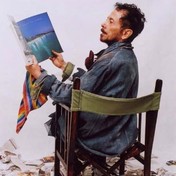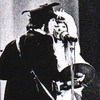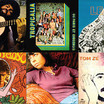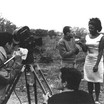Ilumencarnados seres

tom zé
Interviews
Ana de Oliveira – How was the Tropicália experience for you, a musician whose formation had, until then, more to do with rural folklore and erudite experimentalism, unlike the others who had always had Bossa Nova as their most solidly assimilated element?
Tom Zé – Besides the folklore and the erudite experimentalism, I also dedicated myself – as an attempt to practice a median virtue (as the Romans wanted) – to little alterations in the popular music forms – when practiced with so much repetition, they seemed like stone.
Ana de Oliveira – Do you agree with the idea that your most particular contribution to the group and to the movement was your satiric vein, corrosively critical-ironic?
Tom Zé – And the formal restiveness.
Ana de Oliveira – To what extent did your erudite musical information, acquired at the Free Seminars in the University of Bahia, facilitate your relations with the Tropicalismo’s avant-gardist conductors?
Tom Zé – Not very much. I was obliged to write music, which was no advantage at all.
Ana de Oliveira – When Gil and Caetano were arrested, did you command “Divino, Maravilhoso” on your own? How many times and how was this experience?
Tom Zé – I commanded it twice. In these editions of “Divino Maravilhoso” some funny things happened. Fernando Faro didn’t believe in the kind of musical performance I was proposing. He would let me perform without my knowing that I was not being filmed. However, sometimes the audience was so enthusiastic that he asked me to repeat it so that he could film it. And it was never the same, because neither me or the audience could “pretend” the pleasure of the novelty.
Ana de Oliveira – How was your experience here during their exile?
Tom Zé – I missed them a lot.
Ana de Oliveira – Do you think that your albums from the 70’s – which radically innovated – are natural extensions of what you did in Tropicalismo?
Tom Zé – Not always.
Ana de Oliveira – What do you see as Tropicalista in the current works of Caetano and Gil?
Tom Zé – They are obeying the natural flow of their interests, of their hearts.
Ana de Oliveira – Since you moved, you have always lived in São Paulo. Why?
Tom Zé – Out of roughness, because of my marriage, because during my ostracism, São Paulo’s university class – so numerous that it can bargain a profession to someone they elect – made me keep being a musician: universities of São Paulo’s capital and interior.
Ana de Oliveira – How was the experience of being part of the revolutionary Tropicalista movement?
Tom Zé – It was an undeserved privilege and an undeserved burial.





















